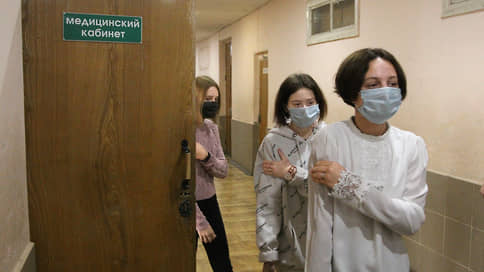Hardcore – Newspaper Kommersant No. 65 (7510) dated 04/14/2023
[ad_1]

Russian doctors have compiled a rating of vaccinations that parents refuse. Information about this was provided to Kommersant by the professional service Aktion Medicine, which regularly interviews doctors. Most often, parents are afraid of DPT – a common vaccine against whooping cough, diphtheria and tetanus. 80% of doctors are ready to take the time to explain the benefits of vaccinations, but only in 10% of cases they manage to convince parents.
Aktion Medicine, a professional expert support service for doctors, provided Kommersant with the results of a survey of doctors on the topic of refusing to be vaccinated. 463 doctors answered the questions of the service, of which 52% are pediatricians. The study showed that 58% of the surveyed doctors regularly face reluctance to take advantage of free vaccination of children in the maternity hospital and clinic. At the same time, almost a third of the doctors surveyed face refusals to vaccinate children in 20-40% of cases; another 10% of doctors said about 40-60% of cases, and 6% reported that more than 60% of parents ignore vaccination. More than half of the respondents (52%) heard from their parents an argument about the fear of complications. Another 40% have encountered staunch “anti-vaccinators” who “cannot be persuaded to vaccinate a child.” And 3% of doctors said that parents only trust foreign vaccines.
During the survey, doctors told which vaccinations Russians refuse most often. 78% of respondents named DPT – adsorbed pertussis-diphtheria-tetanus vaccine. In second place (42%) are the Mantoux test and diaskintest (diagnosis of tuberculosis; it is not a vaccine, but is perceived by some parents as a potentially dangerous action). In third place is BCG – a vaccine against tuberculosis (38%). This is followed by oral polio vaccine (36%) and measles vaccine (33%). And 15% of doctors answered that they had encountered cases of refusal of all these vaccinations. At the same time, almost half of the doctors surveyed (48%) said that parents often present “unreasonable medical exemptions” issued by colleagues in order to “play it safe”.
Attempts to convince staunch opponents of vaccination are made by 80% of the doctors surveyed. They talk about the benefits of vaccinations and about the severe complications of the diseases they protect against. But only 38% of respondents managed to change the decision of their parents. 10% succeed “almost always” if they are “not anti-vaccine” in front of them. 28% are more likely to convince parents, “but it’s not easy.”
There are not so many people who take an openly anti-vaccination position, says Associate Professor of the Department of Infectious Diseases in Children of the Russian National Research Medical University. N. I. Pirogov Ivan Konovalov. However, they create an additional information field and “infect with doubts” people who do not have enough information from relevant and competent sources. The infectious disease specialist of the Doctis telemedicine service, Elizaveta Temnik, most often hears from parents who do not want to vaccinate their children the following argument: “Why, if the infection is extremely rare?” In such cases, she explains that at the family level, it is the responsibility of the parent to vaccinate a child or not, but at the population level, unvaccinated children increase the likelihood of infection and outbreaks. Elizaveta Temnik recalls that a wide range of serious diseases can be prevented by vaccinations, and not only those included in the national calendar. These are, for example, cervical cancer, ENT infections, rotavirus gastroenteritis.
Recall that in January, Rospotrebnadzor announced the start of a “cleansing” immunization against measles. This is the name given to the vaccination of unvaccinated and not ill before, as well as once vaccinated children and adults. Later, in March, the supervisory service reported that the number of measles cases in Russia had increased: such cases were recorded in the Moscow, Leningrad, Samara, Novosibirsk regions, Altai and Krasnodar regions and a number of other regions. And since April 7, the authorities of Makhachkala have established a temporary ban on visiting children who have not been vaccinated against measles or have been vaccinated once in all municipal educational organizations. On April 12, the metropolitan department of Rospotrebnadzor reported that a case of measles infection was discovered at the Russian State University of Oil and Gas. Because of this, the university must switch to a remote work format for 21 days.
Ivan Konovalov explained to Kommersant why local outbreaks of measles are now being recorded in Russia. In the late 1980s, virtually all infections were eradicated with vaccines, he says, and even healthcare workers began to question the need to continue “comprehensive vaccination.” “Therefore, in the 1990s, in the 2000s, a sufficient number of children were born whose parents did not bother with this issue. When from the 2010s we began to observe massive imported cases, for example, measles, it turned out that already adults are getting infected, ”the expert says. It is significant that from 20% to 30% of measles cases are people over 16-18 years old. As a result, the infection has ceased to be a “classic childhood disease,” the doctor states.
[ad_2]
Source link








